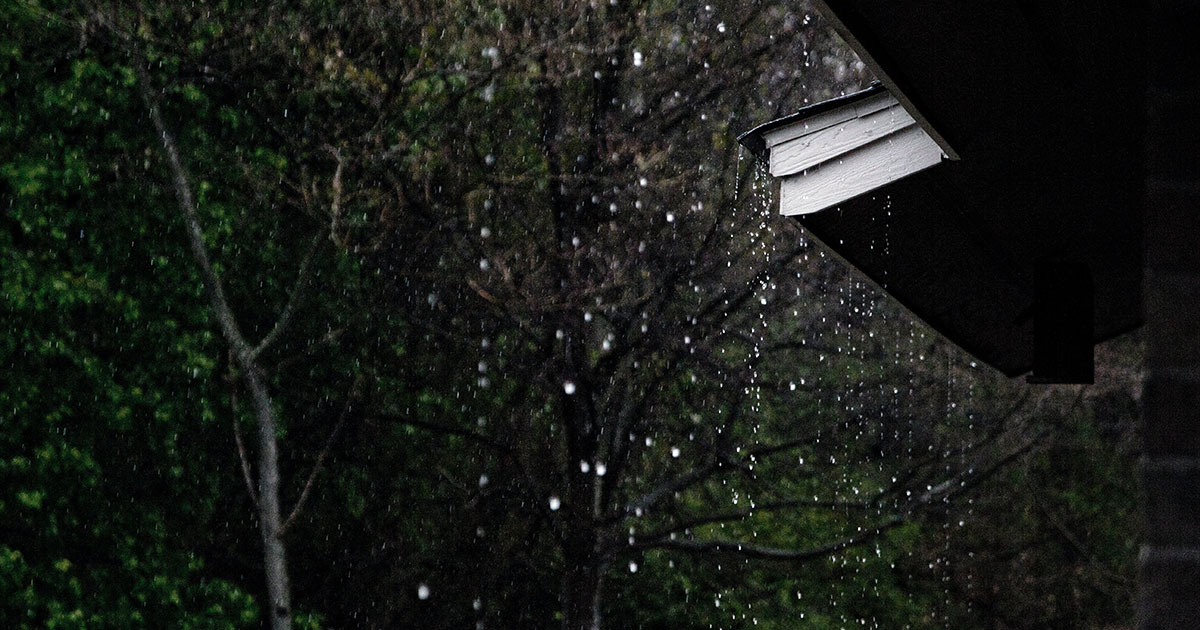XIMENA GÓMEZ
★ ★ ★ ★
POETRY

When the Rain Stops
It begins by dripping.
A light charged with electricity
Appears in the sky,
Collapses into rain, in minutes
Forms puddles on the stones of the patio.
Wind batters the trees,
A coconut palm bends above a roof,
Three yellow coconuts roll along the clay tiles.
It’s beautiful to observe the threat of water,
From the intimacy of your home, surrounded by books,
The dining room, the orange and yellow light of the lamps,
The dog scared, whining, and your calm voice, very close.
Long ago, there was another house, a different rain,
Fascination of fear, and a small dining room
Where my parents talked, and we ate soup with fried dumplings,
Stewed chicken, rice with paprika, blackberries in syrup …
It was beautiful to feel the dread of rain.
That house no longer exists.
Grillwork, windows, flowerpots,
And the doors … fell demolished.
I can’t reconstruct their ceilings
Or paint the walls.
Their outlines have faded.
Now,
The rain falls on top of your dark wooden house,
And will rain for years,
Until rain becomes something rare
And the house has been demolished and maybe,
Instead of the palms and your front yard,
Only dried-up trees remain, sterile earth,
And some huge toads and mosquitoes
Next to a pond nearly evaporated.
Then no one will hear the click of the doorknob,
Or the engine of your car when it’s turned on,
Or our laughter as we leave the house.
Cuando llegue la sequía
Empieza a gotear,
En el cielo aparece una luz
Cargada de electricidad,
La lluvia se desploma, en minutos,
Se forman charcos en las piedras del patio.
El viento vapulea los árboles,
Una palma de coco se dobla sobre un techo,
Tres cocos amarillos ruedan por las tejas de arcilla.
Hermoso es contemplar la amenaza del agua,
Desde la intimidad de tu casa, los libros alrededor,
El comedor, la luz anaranjada y amarilla de las lámparas,
El perro que asustado gime y tu vos sosegada muy cerquita.
Hace ya mucho tiempo, en otra casa, hubo una lluvia distinta
Y una fascinación del miedo, y hubo un comedor pequeño.
Mis padres conversaban ahí, y comíamos sopa de torrejas
Pollo sudado, arroz con pimentón y moras en almíbar…
Era hermoso sentir el pavor de la lluvia.
Aquella casa ya no está,
Las rejas, las ventanas, las materas con flores
Y las puertas… cayeron demolidas.
No puedo reconstruir los techos,
Ni pintar sus paredes
Sus formas se han desvaído.
Ahora,
Sobre tu casa de madera oscura
Llueve y lloverá por años,
Hasta que la lluvia sea algo raro
Y la casa la hayan derribado y quizás,
Sólo queden árboles resecos, tierra estéril,
Y unos sapos enormes y mosquitos
Junto a una charca casi evaporada,
Donde estaban las palmas y tu antejardín.
Entonces nadie escuchará el clic del cerrojo,
Ni el motor de tu carro al encenderse,
Ni nuestras risas al salir de la casa.
Hillside Barrio
How can I forget those walks,
San Antonio and its streets running downhill,
(In my nightmares opening onto an abyss)
And my fear of rolling down the asphalt,
The white brick church
Lighting up the hill at night,
Bags filled with trash on the sidewalks
When the garbage truck passes;
The bread-seller on his bicycle,
His basket full, honking the horn;
The stray dog that wanders sniffing
And the one that dozes behind the barred window,
And the man in the shiny vest
With the machete in his belt
Patrolling the streets?
Someday soon, maybe
You and I will return.
We’ll walk again at night
Down sidewalks narrow and cracked,
I’ll feel dizzy looking downhill,
And I will grab your hand to keep from falling.
We will go to the church that’s all lit up,
And there will be people milling about in front of the entrance.
We will pass next to bags of garbage,
We will hear again the bread-seller’s
Bicycle horn in the morning,
The stray mutt barking.
We will take photos of the dog in the window,
And at night we will say “hola,”
Respectfully,
To the man with the machete.
If someday soon we return,
We will not be visiting my father,
In the intimacy of the chapel,
His body shrunken, dressed-up
For his last photograph; we will not see
The men in dark suits
Take away his coffin,
Or his body disappear
Behind a metal door.
If someday soon we return,
San Antonio will still bake in the sun.
There will still be vines growing on the houses.
Perhaps the café we went to on the day
Of the funeral will still be there,
With its smell of espresso, stools, and wooden tables,
But you and I, will we be the same?
Barrio empinado
¿Cómo olvidar aquellas caminadas,
San Antonio y sus calles en declive,
(Que son abismos en mis pesadillas)
Y mi miedo a rodar por el asfalto.
La iglesia de ladrillo, blanca,
Que ilumina la loma por la noche.
En las aceras bolsas con desechos,
Cuando pasa el camión de la basura;
Al vendedor de pan en bicicleta,
Con el canasto lleno, tocando la bocina;
Al perro callejero que vaga olfateando,
Al que dormita en la ventana con rejas
Y al hombre del chaleco brillante
y machete al cinto
Que patrulla las calles?
Un día no lejano, tal vez
Tú y yo regresaremos.
Andaremos de nuevo por la noche
Por aceras angostas y rajadas,
Y sentiré mareo al mirar loma abajo
Y agarraré tu mano para no resbalarme.
Iremos a la iglesia iluminada,
Y habrá gente reunida frente al pórtico.
Pasaremos al lado de bolsas de basura,
Oiremos de nuevo el pito de la cicla
Del vendedor de pan por las mañanas
Y el ladrido del gozque callejero
Y sacaremos fotos del perro en la ventana
Y por la noche le diremos “hola”,
Respetuosamente,
Al hombre del machete.
Si un día no lejano regresamos,
Ya no visitaremos a mi padre,
En la intimidad de la capilla,
Su cuerpo encogido, acicalado,
Para la última foto; ni veremos
Los hombres de vestido oscuro
Llevárselo en el féretro,
Ni al cuerpo desaparecer
Tras una puertecita de metal.
Si un día no lejano regresamos,
San Antonio hervirá aún bajo el sol,
Aún crecerán enredaderas en las casas,
Quizá el café al que fuimos
El día del funeral, estará allí aún, con el olor a expreso
Y los bancos y mesas de madera,
¿Pero tú y yo seremos los que fuimos?

Ximena Gómez is a Colombian poet, short-story writer, translator, and psychologist. Translations of her poems into English have been published in Sheila-Na-Gig, Cigar City Journal, Two Chairs, The Laurel Review, Nashville Review, Gulfstream, and Cagibi. She has published two collections of poetry, Habitación con moscas (Ediciones Torremozas) and Último día / Last Day (Katakana Editores), whose title poem was a finalist for The Best of the Net award in 2018, and a translation of George Franklin’s Among the Ruins / Entre las ruinas (Katakana Editores). She now lives in Miami, Florida.
























0 Comments